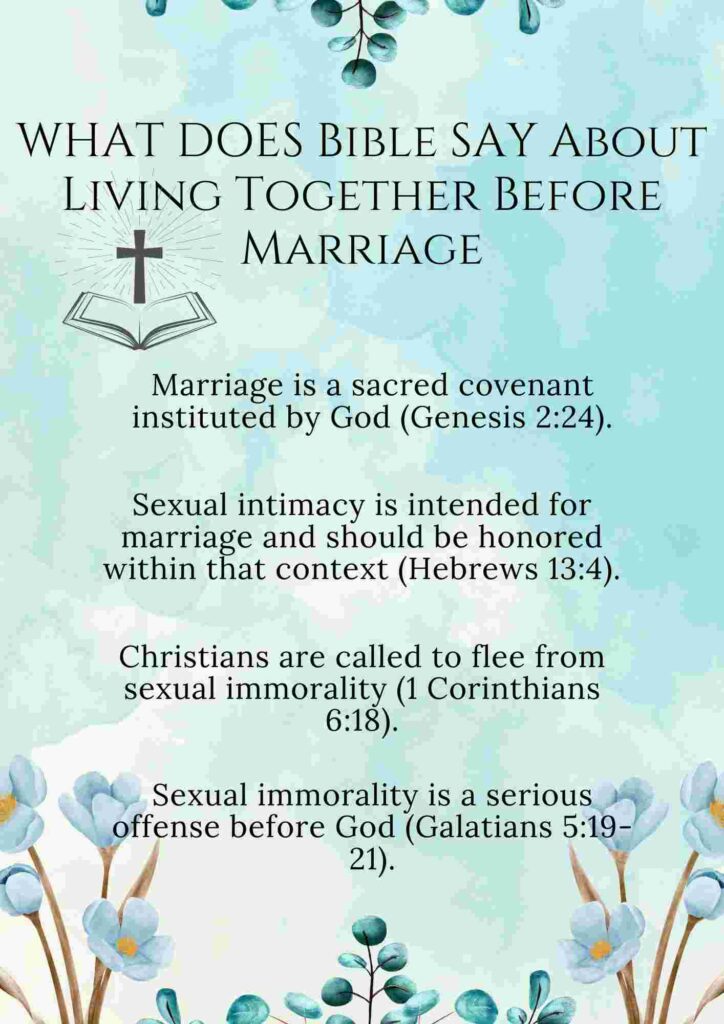The topic of Bible About Living Together Before Marriage, as addressed in the Bible, raises fundamental questions about relationships, morality, and God’s design for human unions. In examining the Scriptures regarding this issue, we explore timeless principles that shape our understanding of love, commitment, and spiritual integrity.
The importance of addressing this topic in light of Biblical principles cannot be overstated. The Bible provides foundational guidance on how we should conduct ourselves in relationships, emphasizing purity, honor, and the sanctity of marriage. By delving into what the Scriptures teach about cohabitation, we gain clarity on how to align our lives with God’s will and uphold His standards in a world often at odds with His design for intimacy and commitment.
What Does The Bible Say About Living Together Before Marriage?
The Bible does not explicitly address the practice of living together before marriage in modern terms, as cohabitation as we understand it today was not common in ancient biblical times. However, several principles and teachings in the Bible provide guidance on relationships, purity, and marriage that can be applied to this topic:
-
Marriage is a sacred covenant instituted by God (Genesis 2:24).
-
Sexual intimacy is intended for marriage and should be honored within that context (Hebrews 13:4).
-
Christians are called to flee from sexual immorality (1 Corinthians 6:18).
-
The Bible teaches the importance of purity in both actions and thoughts (1 Thessalonians 4:3-5).
-
Marriage reflects the relationship between Christ and the church, emphasizing commitment and fidelity (Ephesians 5:31-33).
-
God’s design for relationships includes honoring Him with our bodies (1 Corinthians 6:19-20).
Also, Check: 126+ Bible Verses About Marriage
-
Cohabitation outside of marriage can lead to temptation and compromise (Proverbs 6:27-28).
-
Christians are called to live lives of holiness and to avoid the practices of the world (Romans 12:2).
-
God desires His people to seek His will and guidance in all relationships (Proverbs 3:5-6).
-
The Bible encourages believers to guard their hearts and minds against impurity (Philippians 4:8).
-
The concept of “one flesh” in marriage implies a deep spiritual and physical unity (Mark 10:8).
-
God’s commands are meant for our good, including His guidelines for relationships (Deuteronomy 6:24).
-
Sexual immorality is a serious offense before God (Galatians 5:19-21).
-
God’s grace and forgiveness are available to those who seek repentance (1 John 1:9).
-
Marriage is a reflection of God’s love and faithfulness (Hosea 2:19-20).
-
The Bible teaches that love is patient and kind, not self-seeking or dishonoring (1 Corinthians 13:4-7).
-
Christian relationships should be characterized by mutual respect and commitment (Ephesians 5:21-33).
-
The example of Joseph and Mary illustrates purity and obedience to God’s will (Matthew 1:18-25).
-
Christians are called to live as ambassadors of Christ, reflecting His character in all relationships (2 Corinthians 5:20).
-
The Holy Spirit empowers believers to live according to God’s standards of righteousness (Galatians 5:16-17).
Also, Find out: 200+ Bible Verses About Love [Marriage, Strength, Hope]
-
Seeking God’s wisdom leads to paths of righteousness and obedience (Proverbs 2:6-9).
-
God’s Word is a lamp to guide our feet and a light for our path (Psalm 119:105).
-
The example of Daniel shows commitment to purity and obedience to God’s commands (Daniel 1:8-16).
-
The importance of accountability in relationships helps maintain purity and integrity (James 5:16).
-
The fruit of the Spirit includes self-control, which aids in honoring God in relationships (Galatians 5:22-23).
-
The example of Ruth and Boaz demonstrates integrity, honor, and commitment in relationships (Ruth 2-4).
-
The parable of the wise and foolish builders highlights the importance of building relationships on a solid foundation (Matthew 7:24-27).
-
The example of Esther illustrates courage and faithfulness to God’s purposes (Esther 4:14).
-
The importance of prayer in seeking God’s will and guidance in relationships (Philippians 4:6-7).
-
The example of Solomon warns against the dangers of compromising integrity and purity (1 Kings 11:1-6).
-
The book of Song of Solomon celebrates the beauty and sanctity of marital love (Song of Solomon 8:6-7).
-
The example of Adam and Eve demonstrates the divine intention for companionship and unity in marriage (Genesis 2:18).
-
The example of Isaac and Rebekah shows God’s providence and guidance in relationships (Genesis 24).
-
The example of Job illustrates faithfulness and integrity in the face of trials (Job 1:1).
-
The example of Paul emphasizes the importance of self-control and discipline in relationships (1 Corinthians 9:24-27).
-
The example of Mary Magdalene illustrates forgiveness and redemption through Christ (Luke 7:36-50).
-
The example of Zacchaeus demonstrates repentance and transformation through encountering Jesus (Luke 19:1-10).
-
The example of the Samaritan woman at the well shows Jesus’ compassion and desire for spiritual transformation (John 4:1-42).
-
The example of Timothy highlights faithfulness and dedication in serving God (Philippians 2:19-24).
-
The example of Peter illustrates restoration and forgiveness after denying Jesus (John 21:15-19).
-
The example of Lydia shows hospitality and generosity in serving others (Acts 16:11-15).
-
The example of Barnabas demonstrates encouragement and support in ministry (Acts 4:36-37).
-
The example of Priscilla and Aquila illustrates partnership and teamwork in spreading the gospel (Acts 18:1-3, 18-28).
-
The example of the early church in Acts emphasizes unity and community in fellowship (Acts 2:42-47).
-
The example of Dorcas (Tabitha) shows compassion and service to the needy (Acts 9:36-43).
-
The example of Stephen demonstrates courage and faithfulness in martyrdom (Acts 6:8-15; 7:54-60).
-
The example of Philip illustrates evangelism and obedience to God’s leading (Acts 8:26-40).
-
The example of Silas and Timothy shows dedication and commitment in ministry (Acts 16:1-5).
-
The example of Apollos demonstrates eloquence and fervor in preaching the gospel (Acts 18:24-28).
-
The example of John Mark illustrates growth and restoration in serving alongside others (Acts 12:12-25; 15:36-41).
While the Bible does not directly address cohabitation before marriage, these principles underscore the importance of honoring God’s standards for relationships, respecting the sanctity of marriage, and pursuing purity in our actions and intentions. Ultimately, the Bible’s teachings encourage believers to seek God’s will in their relationships, prioritize commitment and fidelity, and uphold the principles of love, respect, and holiness in all aspects of their lives.
Biblical Foundation
Understanding the biblical foundation for relationships, marriage, and sexual purity is crucial for navigating life’s challenges and decisions. The Bible provides timeless principles that guide believers in honoring God and living according to His will in every aspect of life, including relationships.
1. Marriage as Instituted by God
Marriage is not merely a human institution but a divine establishment ordained by God Himself. Genesis 2:24 states, “Therefore a man shall leave his father and his mother and hold fast to his wife, and they shall become one flesh.” This foundational verse reveals God’s design and purpose for marriage: a sacred union where two individuals leave their families to form a new, unified entity under His blessing and guidance.
2. Sexual Purity and Holiness
The Bible underscores the importance of sexual purity and holiness in both thought and action. 1 Thessalonians 4:3-5 affirms this principle: “For this is the will of God, your sanctification: that you abstain from sexual immorality; that each one of you know how to control his own body in holiness and honor, not in the passion of lust like the Gentiles who do not know God.” This passage emphasizes the necessity for believers to honor God with their bodies, maintaining purity and avoiding the worldly temptations of lust and immorality.
These foundational truths provide a solid framework for understanding God’s intent for relationships and marriage. They call believers to uphold the sanctity of marriage, pursue purity in all aspects of life, and honor God with their bodies as they navigate the complexities of relationships in a world that often challenges these principles.
Challenges of Cohabitation
Cohabitation, or living together before marriage, presents various challenges that impact individuals spiritually, emotionally, and relationally. While modern culture may normalize this practice, it’s essential to consider these challenges through the lens of biblical teachings and practical wisdom.
1. Temptations and Compromise
Ephesians 5:3 admonishes believers: “But sexual immorality and all impurity or covetousness must not even be named among you, as is proper among saints.” Cohabitation can create an environment where boundaries are blurred, leading to increased temptations and compromises in moral and spiritual values. Living together before marriage may inadvertently prioritize physical intimacy over the spiritual and emotional aspects of a committed relationship. This can strain personal integrity and lead to difficulties in maintaining purity and honoring God’s standards for relationships.
2. Lack of Commitment
From a biblical perspective, marriage is viewed as a sacred covenant between a man and a woman. Matthew 19:6 states, “So they are no longer two but one flesh. What therefore God has joined together, let not man separate.” Cohabitation often lacks the solemn commitment and public declaration that characterize marriage. Without the formal covenantal commitment before God and society, there may be less incentive for couples to work through challenges or fully invest in building a lasting relationship. This can lead to a lack of clarity about the future of the relationship and potentially hinder personal and relational growth.
3. Emotional Instability
Living together without the security of marriage can introduce emotional instability into the relationship. Uncertainty about the future, differing expectations, and unresolved conflicts may create a volatile environment. The absence of a clear commitment can amplify feelings of insecurity, anxiety, and emotional dependency. This can hinder the ability to build trust and mutual respect, essential foundations for a healthy and enduring relationship.
4. Spiritual Consequences
For believers, cohabitation raises spiritual concerns regarding obedience to biblical principles and God’s design for relationships. Scripture emphasizes the importance of honoring God with our bodies and maintaining sexual purity (1 Thessalonians 4:3-5). Engaging in cohabitation can lead to feelings of guilt, spiritual distance, and a compromised relationship with God. It may also impact one’s witness and influence as a follower of Christ, affecting personal integrity and the ability to exemplify God’s standards in all areas of life.
5. Social and Family Dynamics
Cohabitation can also affect social and family dynamics. Different cultural and generational perspectives on relationships may lead to misunderstandings or disapproval from family members or friends. The lack of a formal commitment may raise concerns about stability and long-term intentions, impacting broader social interactions and support systems.
Navigating the challenges of cohabitation requires careful consideration of biblical teachings, personal values, and practical realities. While every relationship is unique, honoring God’s standards for purity, commitment, and emotional health remains foundational. Seeking wisdom through prayer, seeking counsel from mature believers, and prioritizing spiritual growth can guide individuals and couples in making decisions that align with God’s will and promote flourishing relationships based on love, respect, and mutual commitment.
Godly Wisdom and Practical Advice

I’m father joaquin perez, we are a catholic church with all the sacraments where everybody is welcome. we celebrate catholic mass every Sunday at 12:30pm at saint stephen episcopal church at 2750 McFarlane road, Miami, Florida

